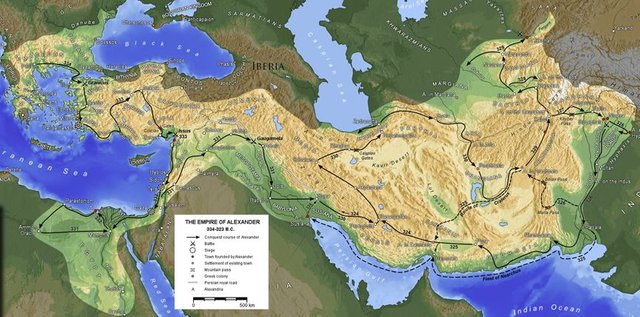330 BC - The murder of Darius
Alexander decides after his stay in Susa to conquer the remaining residences. But unexpected difficulties lurk in the Persian highlands: the important mountain passes are occupied by the Persians, and the competent satrap Ariobarzanes succeeds in teaching Alexander a first defeat. But when the Macedon divides his troops and puts his opponent in his hand, he can conquer the pass called the Persian Gate.
Then it goes to Persepolis. While Susa is the official government center of the empire, Persepolis represents the cultural center. Despite its importance, the city of kampos is handed over to Alexander. With this conquest the campaign is terminated oziell. As a reward for the services rendered, Alexander gives his soldiers the city for plunder. As a visible sign of the end of the Persian rule Alexander then burn down the royal palace. Concerns of his advisors that he destroyed his own property and the action could disturb the relationship between winners and defeated, the king does not pay attention this time. Now Alexander can finally take care of Darius. On the rumor, Darius is already preparing for battle, Alexander undertakes a forced march of 700 kilometers. But at the finish it turns out that Darius is raised again. The military situation has now reversed: While Alexander has 50,000 men, the figures for the Persians vary between 9000 and 30,000 men. When the Macedon finally overtakes the luckless Darius, he only imagines him dead - murdered by his own men. Alexander honors the dead and vows to punish the murderers.
330-327 BC - The Long March to the East
The relationship between Alexander and his Macedonian companions is increasingly difficult. He has long outgrown his origins and adopted oriental ideas. The idea of his divine descent nourishes the plans for world domination. As he wants to take over parts of the Persian court ceremonial, leading heads of his staff refuse to pay homage to him. A conspiracy against him causes Alexander to a cruel revenge reaction: not only the participants are executed, others who could theoretically become dangerous to his rule, let Alexander assassinate. When the peace is restored, he crosses the Hindu Kush in the spring of 329. Bessos, one of Darius' murderers, had made himself king. However, it quickly becomes clear that he, too, can not stop Alexander's advance. Finally, Bessos is handed over to Alexander, who cuts off his nose and ears and hands him over to Darius' brother for crucifixion.
The growing alienation between Alexander and his troops shows in a tragic incident in the summer of 328: At a banquet Alexander gets into an argument with Kleitos. In anger, he stabs his friend, who once saved his life on the Granikos, with a spear. Another conspiracy in the immediate vicinity of Alexander shows how tense the situation is. And again he acts with extreme severity. The culprits are stoned and numerous more or less suspects are murdered at his behest.

